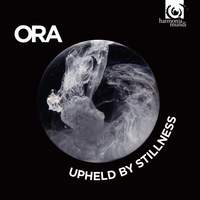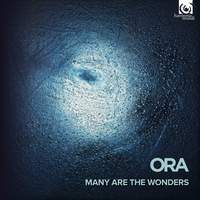Recording of the Week,
Sanctissima from the ORA Singers
Sanctissima (recorded back in 2017 but only released this month) weaves a similarly colourful tapestry of old and new elements, although the inspiration here is plainsong rather than one single work from the previous choral ‘Golden Age’: Digby describes the project as ‘a fantasy reconstruction of a Vespers and Benediction service that might be performed in honour of the Assumption of the Virgin Mary’ (a feast which was celebrated earlier this week), and the riches on offer include commissions by Julian Anderson, Giles Swayne, Sven-David Sandström and Matthew Martin.
We’re greeted not by voices but tolling bells: a one-minute carillon sets an appropriately ecclesiastical tone for an album that’s firmly grounded in liturgy, and segues seamlessly into one of the three little ‘Renaissance gems’ that are studded throughout the programme. Palestrina’s Assumpta est Maria receives a buoyant, crisp performance which showcases the ensemble’s agility, immaculate balance and clean but vibrant sound: the mixed-sex alto section (including mezzo Helen Charlston, who has since gone on to forge a distinguished solo career) provides a lovely piquancy, and the tenors’ collective restraint when ascending above the stave is one of the album’s many quiet pleasures.
Sections of plainchant, all delivered with fluidity and unobtrusive care for the text, act as connecting threads: the structure may not work for all listeners, but I’d suggest that you’d be missing out by skipping straight to the ‘meat’ of the programme given that part of the pleasure comes from listening out for each composer’s response to the material that’s gone directly before.
The first of the new commissions is David Bednall’s jazz-inflected setting of Assumpta est Maria, which dances along with gentle exuberance: along with James MacMillan’s largely homophonic Ave Maris Stella (written for Truro Cathedral in 2011), this is one of the few works on the menu which sounds as if it could sit within the comfort-zone of a decent amateur choir, and interested parties might like to check out the sheet-music here.
Olivier Tarney’s awestruck depiction of the Assumption in In Homeward Flight – the only English-language setting on the programme – was the work which made the strongest initial impact on me, opening with a Tavener-esque bass drone and soaring slowly into the stratosphere before dissolving into thin air. There’s an Orthodox slant, too, to the late John Joubert’s Reflection on the Plainchant Antiphon ‘In odorem’, before the gently rocking bass gives way to a higher-energy section centring on the word ‘currimus’ (‘hasten’). (Both Joubert and Sandström died in 2019, and the late works included here show each composer at the height of his powers).
ORA alto Kim Porter’s radiant treatment of Pulchra es et decora is perhaps the work which takes its cue most obviously from plainchant, and there’s a real sense here of a composer who knows the ensemble from within. Giles Swayne’s virtuosic Benedicta filia (requiring rapid-fire delivery of text from all concerned and taking the sopranos to a high C) and Julian Anderson’s brilliantly inventive setting of the Magnificat both revel in exploiting the group’s technical capabilities to the max, whilst Matthew Martin’s Sanctissima flows on so naturally from Francisco Guerrero’s response to the same text that the early stretches sound for all the world as if they were penned by a Renaissance composer (Gesualdo, maybe?) in harmonically adventurous mood.
After a luminous Tantum ergo from the late Sven-David Sandström (where the extraordinary closing chords had me checking that an organist hadn’t been enlisted for this one track), we end back in the Renaissance with Felice Anerio’s Ave Regina caelorum. Much to enjoy here, for both the casual listener and choir-directors in search of pastures new…
ORA Singers, Suzi Digby
Available Formats: 2 CDs, MP3, FLAC, Hi-Res FLAC, Hi-Res+ FLAC
ORA, Suzi Digby
Available Formats: MP3, FLAC, Hi-Res FLAC
ORA, Suzi Digby
Available Formats: CD, MP3, FLAC, Hi-Res FLAC
ORA Singers, Suzi Digby
Available Formats: CD, MP3, FLAC, Hi-Res FLAC, Hi-Res+ FLAC







